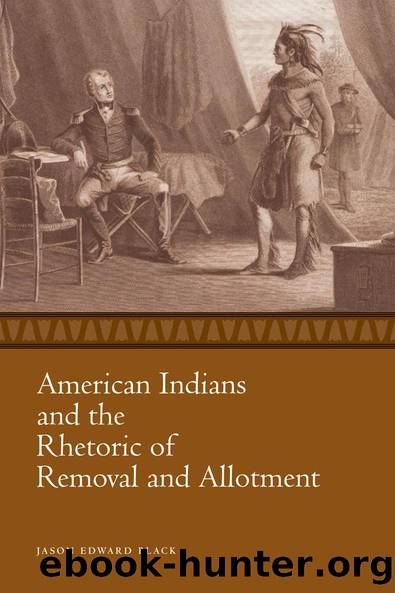American Indians and the Rhetoric of Removal and Allotment by Jason Edward Black

Author:Jason Edward Black [Black, Jason Edward]
Language: eng
Format: epub
Tags: History, Indigenous Peoples of the Americas, Language Arts & Disciplines, Rhetoric, Social Science, Ethnic Studies, Native American Studies, American
ISBN: 9781628461961
Google: Zun9oQEACAAJ
Publisher: University Press of Mississippi
Published: 2015-01-15T02:50:29+00:00
CONCLUSION
Identity Duality and the Legacies of Colonizing and Decolonizing Rhetoric
IN 1906, AFTER EIGHT YEARS OF WORKING HIS LAND THROUGH ALLOTment, activist Dewitt Clinton Duncan (Cherokee) concluded that the Dawes Act had not improved his condition as either a self-sufficient American Indian or a US citizen. Duncan took particular umbrage with how the Interior Department intruded on Native lands, thus violating any semblance of sovereignty or citizenship. Of this colonial travesty, he exhorted a congressional committee, âSuppose the federal government send a survey company into the midst of some of your central counties of Kansas or Colorado or Connecticut and run off all the surface of the earth into sections and quarter sections . . . rescinding and annulling all title.â1 Appealing to a sense of fairness and equity he then asked, âWould Colorado submit to it? Would Kansas brook such an outrage? No! . . . There is not an American citizen in any of these states [who] should submit to it, even if it cost him every drop of his heartâs blood.â Expressing his discontent with the governmentâs license to encroach on Native lands as a dominant force, Duncan concluded that such oppressive actions would ultimately amount to âruin, immeasurable ruin; devastation.â2
Vitally, Duncanâs resistance represented one of the ways that American Indian remonstrations to allotment spoke to the colonizing and decolonizing discourses extant in the Native-US relationship and to the identity duality that continued into the twentieth century. He worked through the policyâs pledges of citizenship to construct American Indian and US citizen identities as equally included. To this end, Duncanâs scenario analogized Native communities to âAmerican citizen[s] in any of these states,â drawing the two together as joint identities under the governmentâs aegis. Emancipating opportunities like these allude to the empowerment that American Indians experienced in the twentieth century. According to Frederick Hoxie, political leaders such as Duncan demonstrated how Natives had a âsayâ in Native-US affairs along with their governmental counterparts. This talk âproduced resultsâ and eventually led to both American Indian citizenship and a retraction of the Dawes Act.3
Around the time of Duncanâs decolonial rebuke of allotment, Ruth Muskrat Bronson (Cherokee) was experiencing the same lag in the so-called benefits of the Dawes Act. As with Duncan, she addressed the governmentâs lapses in fulfilling its republican aims by parceling Native lands and assimilating American Indians. According to Peter Nabokov, Bronsonâs 1910 essay to the Interior Department likely sparked some thought about ârevising the allotment policy,â especially when combined with other decolonial protests from the era.4 In her essay she told the story of Jim Runningwolf who âtypical of much of the Indian populationâ lost his land to the US government.5 The failure of American Indians to work the land did not factor into the governmentâs rationales for the Dawes Act. Similarly, an extraction of Native territories was not part of the governmentâs benevolent justification for allotment. But, Bronson argued that the Interior Department in particular prompted these difficulties. She wrote that, âthe Indian agent [came] alongâ and said to Runningwolf, âYou are not using your land .
Download
This site does not store any files on its server. We only index and link to content provided by other sites. Please contact the content providers to delete copyright contents if any and email us, we'll remove relevant links or contents immediately.
Cecilia; Or, Memoirs of an Heiress — Volume 1 by Fanny Burney(31352)
Cecilia; Or, Memoirs of an Heiress — Volume 3 by Fanny Burney(30950)
Cecilia; Or, Memoirs of an Heiress — Volume 2 by Fanny Burney(30907)
The Lost Art of Listening by Michael P. Nichols(6485)
We Need to Talk by Celeste Headlee(4881)
Asking the Right Questions: A Guide to Critical Thinking by M. Neil Browne & Stuart M. Keeley(4600)
On Writing A Memoir of the Craft by Stephen King(4222)
Dialogue by Robert McKee(3593)
I Have Something to Say: Mastering the Art of Public Speaking in an Age of Disconnection by John Bowe(3520)
Pre-Suasion: A Revolutionary Way to Influence and Persuade by Robert Cialdini(3422)
Elements of Style 2017 by Richard De A'Morelli(2946)
The Book of Human Emotions by Tiffany Watt Smith(2779)
Good Humor, Bad Taste: A Sociology of the Joke by Kuipers Giselinde(2560)
Name Book, The: Over 10,000 Names--Their Meanings, Origins, and Spiritual Significance by Astoria Dorothy(2498)
Fluent Forever: How to Learn Any Language Fast and Never Forget It by Gabriel Wyner(2451)
The Grammaring Guide to English Grammar with Exercises by Péter Simon(2397)
Why I Write by George Orwell(2363)
The Art Of Deception by Kevin Mitnick(2304)
Don't Sleep, There Are Snakes by Daniel L. Everett(2221)
